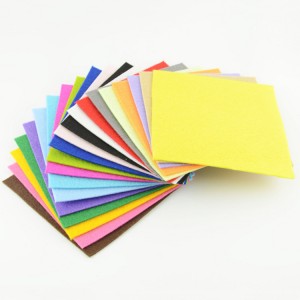In the ever – evolving landscape of materials science, polyester felt has emerged as a game – changer, revolutionizing various industries with its advanced technology and versatile applications. This unassuming material, once considered a simple textile product, has now become a cornerstone in sectors ranging from automotive to aerospace, medical to environmental protection.
The key to polyester felt’s success lies in its continuous technological advancements. Manufacturers are constantly innovating to enhance its properties, making it more durable, functional, and sustainable. For instance, the development of flame – retardant polyester felt has significantly improved safety standards in industries such as aerospace and automotive. In aircraft interiors, this type of polyester felt is used to line cabins, reducing the risk of fire spreading and providing passengers with an added layer of safety. In cars, flame – retardant polyester felt is integrated into car seats and headliners, ensuring that vehicles meet strict safety regulations.
Another remarkable development is the creation of waterproof and breathable polyester felt. This dual – property material is highly sought after in the marine industry. Boat covers made from waterproof and breathable polyester felt protect boats from harsh weather conditions while allowing moisture to escape, preventing mold and mildew growth. In the outdoor apparel market, this technology has also been applied to create jackets and coats that keep wearers dry in the rain but still allow their skin to breathe, enhancing comfort during outdoor activities.
Sustainability is a growing concern across all industries, and polyester felt is no exception. The production of recycled and eco – friendly polyester felt has gained momentum in recent years. By using recycled materials, manufacturers are reducing the demand for virgin resources and minimizing environmental impact. Recycled polyester felt is not only good for the planet but also maintains high – quality performance. It is widely used in home decor products such as rugs, curtains, and cushions, allowing consumers to make environmentally conscious choices without sacrificing style or functionality.
In the filtration industry, polyester felt has become an indispensable material. Its unique structure and properties make it highly effective in filtering various substances. Polyester felt filters are used in air filtration systems, removing dust, pollen, and other airborne particles to improve indoor air quality. In liquid and oil filtration, polyester felt can separate impurities, ensuring the purity of the substances being filtered. This is crucial in industries such as pharmaceuticals, where even the smallest impurity can have a significant impact on product quality.
The agricultural sector is also reaping the benefits of polyester felt. In greenhouses, polyester felt is used to regulate temperature and humidity, creating an optimal growing environment for crops. It can also be used for crop protection, shielding plants from extreme weather conditions and pests. Additionally, polyester felt plays a role in soil erosion control. When used as geotextiles, it stabilizes soil, preventing erosion and promoting sustainable land use.
As the demand for polyester felt continues to grow, manufacturers are investing more in research and development. They are exploring new applications and improving existing ones to meet the changing needs of different industries. With its combination of advanced technology, versatility, and sustainability, polyester felt is set to play an even more significant role in the future of various industries, driving innovation and growth.

Post time: Jun-03-2025
